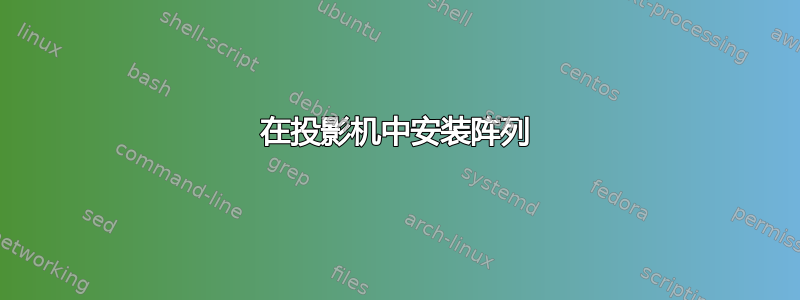
我想让数组适合幻灯片的宽度。
\documentclass[aspectratio=169,xcolor=table]{beamer}
\definecolor{lava}{rgb}{0.81, 0.06, 0.13}
\definecolor{myblue}{rgb}{0.0, 0.30, 0.60}
\newcommand\x[1]{\color{myblue}{\mathbf{#1}}}
\newcommand\y[1]{\color{lava}{\mathbf{#1}}}
\usefonttheme{serif}
\begin{document}
\begin{frame}{Matrix Inverses}
\underline{Understanding Elementary Matrices}
\begin{itemize}
\item if $\mathbf{A}= \left[ \begin{array}{rrrr}
a & b & c \\
d &e &f \\
g & h & i \\
\end{array}\right],$ then $\ldots$
\item[]
$
\mathbf{E}_1\mathbf{A}=\setlength\arraycolsep{4pt}
\left[
\begin{array}{rrrr}
\underline{ 1}\rlap{\underline{~~~~}} & \underline{0} \rlap{\underline{~~~~}} & \underline{ 0} \\
0 & 1 & 0 \\
\x{ -4} & \x{\ 0} &\x 1 \\
\end{array}
\right]
\left[ \begin{array}{rrrr}
a & b & c \\
d &e &f \\
g & h & i \\
\end{array}\right]= \onslide<2->{\hspace{-3em}
\renewcommand\arraystretch{0.25}
\left[ \begin{array}{llllll}
\pause 1\times a \pause +0 \times d \pause +0 \times g & =\y a
& \pause 1\times b \pause +0 \times e \pause +1\times h \pause &=\y b
& \pause 1\times c \pause +0 \times f \pause +0 \times i \pause & =\y c \pause \\
\pause 0 \times a \pause +1 \times d \pause +0 \times g & =\y d
& \pause 0 \times b \pause +1 \times e \pause +0\times h \pause & =\y e
& \pause 0 \times c \pause +1 \times f \pause +0\times i \pause& =\y h \pause \\
\pause \x{-4} \times a \pause + \x{0} \times d \pause + \x{1}\times g & =\y{-4a+g}
& \pause \x{-4} \times b \pause + \x{0} \times e \pause +\x{1} \times h \pause & =\y{-4b+h}
& \pause \x{-4}\times c \pause + \x{0} \times f \pause +\x{1} \times i \pause & =\y{-4c+i}\pause \\
\end{array}\right]}
$
\end{itemize}
\end{frame}
\end{document}
答案1
为了让 3x3 数组适合幻灯片,我认为有必要将长度参数\arraycolsep、\medmuskip和设置\thickmuskip为接近或等于零。要么这样做,要么减小字体大小。我认为将长度参数缩小到接近零是两害相权取其轻。
以下截图显示了文档第 37 页(即最后一页)的输出。请注意,我将数组的布局从 更改llllll为rlrlrl。
\documentclass[aspectratio=169,xcolor=table]{beamer}
\definecolor{lava}{rgb}{0.81, 0.06, 0.13}
\definecolor{myblue}{rgb}{0.0, 0.30, 0.60}
\newcommand\x[1]{\textcolor{myblue}{\mathbf{#1}}}
\newcommand\y[1]{\textcolor{lava}{\mathbf{#1}}}
\usefonttheme{serif}
\usepackage{mathtools} % for 'bmatrix*' env.
\begin{document}
\begin{frame}[t]{Matrix Inverses}
\underline{Understanding Elementary Matrices}
\bigskip
If $\mathbf{A}=
\begin{bmatrix*}[r]
a & b & c \\
d & e & f \\
\,g & h & i
\end{bmatrix*}$, then $\ldots$
\bigskip
$\mathbf{E}_1\mathbf{A}=
\begin{bmatrix*}[r]
\underline{1} \rlap{\underline{~~~~}} &
\underline{0} \rlap{\underline{~~~~}} &
\underline{0} \\
0 & 1 & 0 \\
\x{-4} & \x{0} & \x 1
\end{bmatrix*}
\begin{bmatrix*}[r]
a & b & c \\
d & e & f \\
\,g & h & i
\end{bmatrix*}= $
\medskip
\onslide<2->{\hspace*{-2em}
\setlength\arraycolsep{1pt}
\medmuskip=0mu % spacing around binary operators
\thickmuskip0mu % spacing around relational operators
$\left[\begin{array}{@{} rlrlrl @{}}
\pause 1 \times a \pause +0 \times d \pause +0 \times g \pause &= \kern2pt \y a
& \pause 1 \times b \pause +0 \times e \pause +0 \times h \pause &= \kern2pt \y b
& \pause 1 \times c \pause +0 \times f \pause +0 \times i \pause &= \kern2pt \y c \\
\pause 0 \times a \pause +1 \times d \pause +0 \times g \pause &= \kern2pt \y d
& \pause 0 \times b \pause +1 \times e \pause +0 \times h \pause &= \kern2pt \y e
& \pause 0 \times c \pause +1 \times f \pause +0 \times i \pause &= \kern2pt \y f \\
\pause \x{-4} \times a \pause + \x{0} \times d \pause +\x{1} \times g \pause &= \kern2pt \y{-4a+g}\kern6pt
& \pause \x{-4} \times b \pause + \x{0} \times e \pause +\x{1} \times h \pause &= \kern2pt \y{-4b+h}\kern6pt
& \pause \x{-4} \times c \pause + \x{0} \times f \pause +\x{1} \times i \pause &= \kern2pt \y{-4c+i}\kern2pt
\end{array}\right]$
}
\end{frame}
\end{document}



